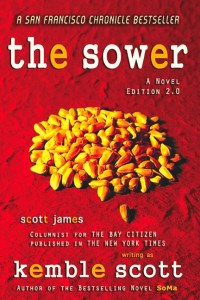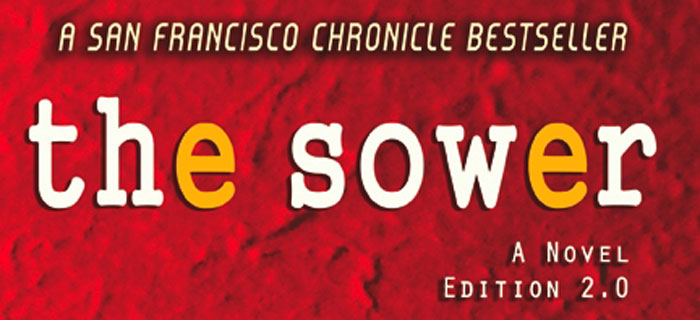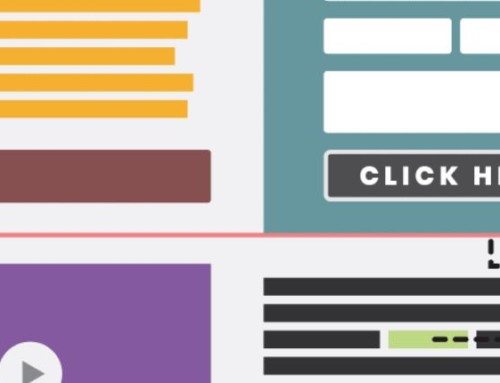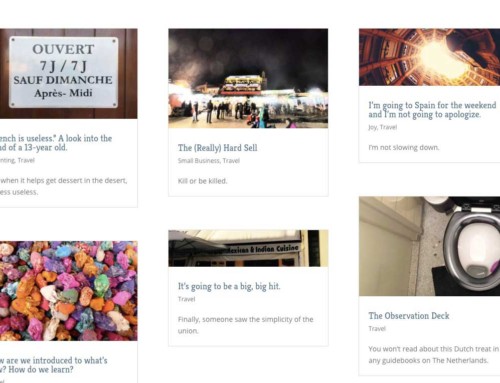A dear friend mourned the recent passing of President John F. Kennedy’s close confidant and speechwriter Ted Sorensen. “He wrote my favorite book,” she said.
Which one? I asked.
She couldn’t remember the title. But I was missing the point – it wasn’t a book she actually read. It was simply a large hardcover of size and heft that had become a useful blunt instrument around the house when she needed to bash something and a hammer wasn’t available or appropriate.
Books, I was reminded, are quite solid objects.
Not so with digital books. In the emerging e-books world, books and the stories they contain aren’t even static – the text can be changed or updated in an instant. When my latest novel, The Sower, was published last year, the first release was as a digital book, and at the time I made the point of saying how this created a new possibility for authors. Once committed to the printed page, our words were locked. Digital books offered a key to get back inside.
 Now I’ve done exactly that with a new digital edition of my novel, The Sower 2.0. I’m told it’s the first version 2 of a novel.
Now I’ve done exactly that with a new digital edition of my novel, The Sower 2.0. I’m told it’s the first version 2 of a novel.
It’s not that I’ve had second thoughts about the first time I wrote the book. The message of the novel is the same, as are the characters, the themes, and the overall story arc. These took years to conceive, and I have not changed my mind.
But the novel has always been set in an alternative version of the present day. It’s a thriller about a manmade supervirus. Instead of killing people, the virus cures all diseases. But there’s a hitch. The only way the virus cure can be passed to others is through sex.
This sets off the ultimate battle of the current culture wars. That’s what drove me to release the first edition last year as an e-book. Digital publishing meant I could work on the novel right up until the hour of publication, making it as topical as the day’s news. With print publishing, a book must typically be completed two years before it reaches readers.
So nearly 18 months after The Sower was first released, my intention was to go into the novel and update all those references to current events so they would be refreshed for late 2010.
Once I got back inside the book, however, I let my imagination run a little wild. I began looking and scenes and wondering – what if I played one crisis a bit differently? What if I moved a different confrontation elsewhere?
These “what if?” questions quickly led me to realize that I wasn’t dealing in a scenario where any change would require a costly new print run. I had the freedom to do anything I desired.
So I ended up reimagining the entire novel, similar to how a film might be re-released in a “director’s cut” edition. There’s a new opening, and what was originally a 30 chapter novel is now 40 chapters – and yet the book overall is shorter.
The new edition of The Sower also allowed me a coming out of sorts. Version 2.0 notes both my pen name, Kemble Scott, and my real name, Scott James. Although not a secret identity, I’ve always written fiction under the pseudonym. But since the first edition was released, I’ve started contributing a weekly column to The New York Times and The Bay Citizen. In the spirit of transparency, which is important in the world of journalism, I’ve now put it all out there.
And for The Sower 2.0’s initial release on Scribd, the book is enhanced with a true advanced web experience – the new reading technology Apture. This allows readers to learn more about aspects of the novel by highlighting a word or phrase. Pop-up windows bring in videos, photos, maps and articles with additional information, all without leaving the text of the novel. It’s an opportunity for a deeper reading experience, while remaining in the story.
Should novels be treated this way?
In a time when audiences have taken the creativity of others for sampling, mash-ups, and reinvention, there’s no reason why authors can’t take some of the same liberties with their own work. This digital era makes this remarkably easy to do.
Of course, there are those of us who still love printed books. So the hardcover edition of The Sower from Numina Press remains for sale for those who prefer to read the book in printed form. It is available in stores in the San Francisco Bay Area, including The Booksmith, Books Inc., A Great Good Place for Books, and A Different Light…plus online everywhere else in the world.
And having the hardcover is important for folks like my friend – she wouldn’t dare hammer anything around the house with a Kindle!







So “Apture” can essentially google any word while inside your book. The coup here is that readers aren’t opening a new window and are less likely to forget what they started out reading, but it’s still a tangent that takes them out of the story.
People read online, engaged in ways that have never been possible before, but few of them read fiction in that way. We can use the new technology to tell stories in totally new ways, but digital publishing is still trying to find that potential. This kind of thing is pushing us along the path, but it’s hard for anyone to see where that path is going.
Checking Out Online Books Through The Internet An online book is defined as a total book that is offered through the Internet. Online books are different to routine ebooks because they are readily available straight on Internet pages, rather than a download, for instance a PDF file download or an outdated EXE format ebook. Ebooks are likewise often dispersed on a CD or DVD, normally to increase the perceived value of a product without adding much cost to the actual production value of the product itself. This offline circulation approach was more typical before the Internet became more common. A number of large tasks have appeared in the last few years which offer individuals access to countless these books. Some of the biggest archives include Allosia Online Books, Project Gutenberg, The Sacred Text Archive, and the job of the University of Pennsylvania. Project Gutenberg explains itself as the first and largest collection, nevertheless new jobs including Allosia Online Books comes close to 250,000 texts, all available online. In lots of cases, locations consisting of MSN assist to digitize public text by sponsoring large digitization tasks to make details available totally free to everybody. This is typically made with content that exists in the general public domain, consisting of books which have ended copyright approval. Lots of people prefer to offer ebooks as PDF files online, as the production expense is extremely low, meaning a higher earnings margin – however this is constantly anticipated to be an incredibly fast-moving market which business like Clickbank assistance to moderate. A major issue with online books is the inability to obtain them off the screen, a lot of people believe that they will never ever be able to truly compete with physical books. Technologies continue to emerge to shift the paradigm – portable inexpensive and reliable ebook readers can keep thousands of ebooks at a time, and even more. Such digital gadgets can be taken with people anywhere, assisting to maintain the sensation of an actual book.